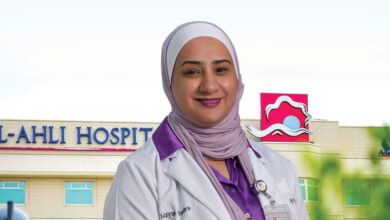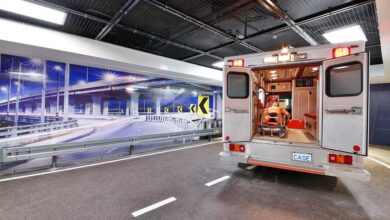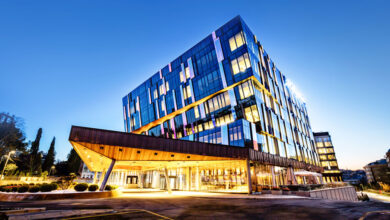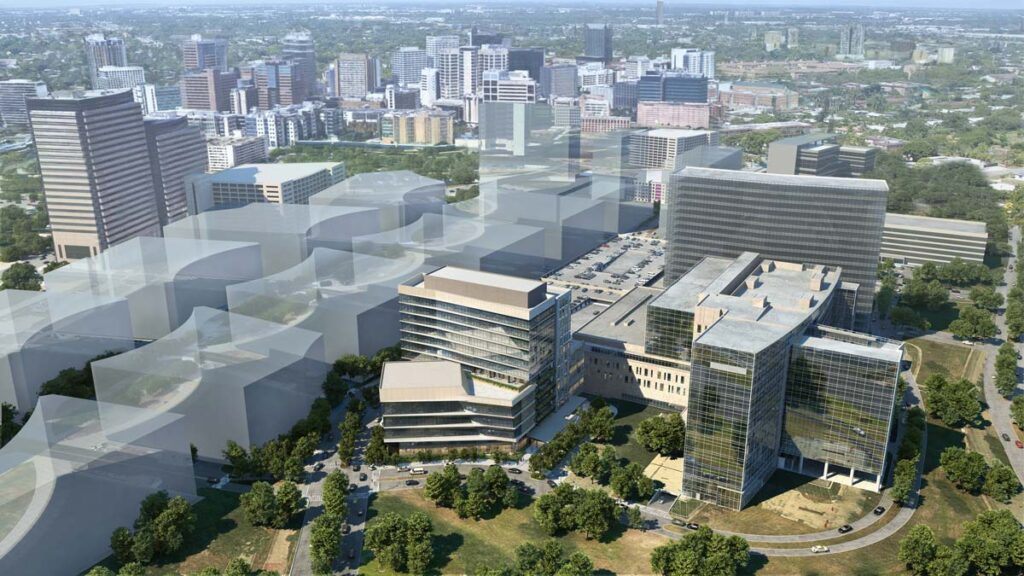
When it comes to treating serious illness, patients from the Middle East and beyond regularly choose Baylor St. Luke’s Medical Center in Houston, Texas, the fourth largest city in the United States. We are a quaternary care facility that is part of the Texas Medical Center, the largest medical center in the world. We are home to the Texas Heart® Institute, a world-class cardiovascular research and education institution founded in 1962 by Denton A. Cooley, MD.
Baylor St. Luke’s is ranked as one of the United State’s best in Cardiovascular Services & Heart Surgery, Cancer, Neurology & Neurosurgery, Gastroenterology and GI surgery and Geriatrics by U.S. News & World Report. We were the first hospital in Texas and the Southwest designated a Magnet® hospital for nursing excellence five consecutive times by the American Nurses Credentialing Center.

Baylor St. Luke’s is committed to excellence and compassion in caring for the whole person while creating healthier communities. The hospital has embarked on a new era in healthcare through a joint venture with Baylor College of Medicine, one of the top medical schools in the United States.
We are transforming the way healthcare is delivered through our new McNair campus, 27.5 acres that will connect one of the country’s top medical schools, a world-renowned cardiovascular research institute, and a nationally recognized hospital all located within a carefully planned corridor designed to ease
patient stress and travel.
Complex Aortic Arch Repair
Our cardiac physicians are healers and researchers at the forefront of breakthrough therapies. Dr. Joseph Coselli, Chief Adult Cardiac Surgery Section, Baylor St. Luke’s Medical Center, is a world-renowned pioneer in the development of innovations including the Thoraflex Hybrid Stented Device for Complex Aortic Arch Repair, which was recently awarded a breakthrough designation from the United States Food and Drug Administration (FDA). The device is expected to significantly lower mortality rates among aortic rupture patients.
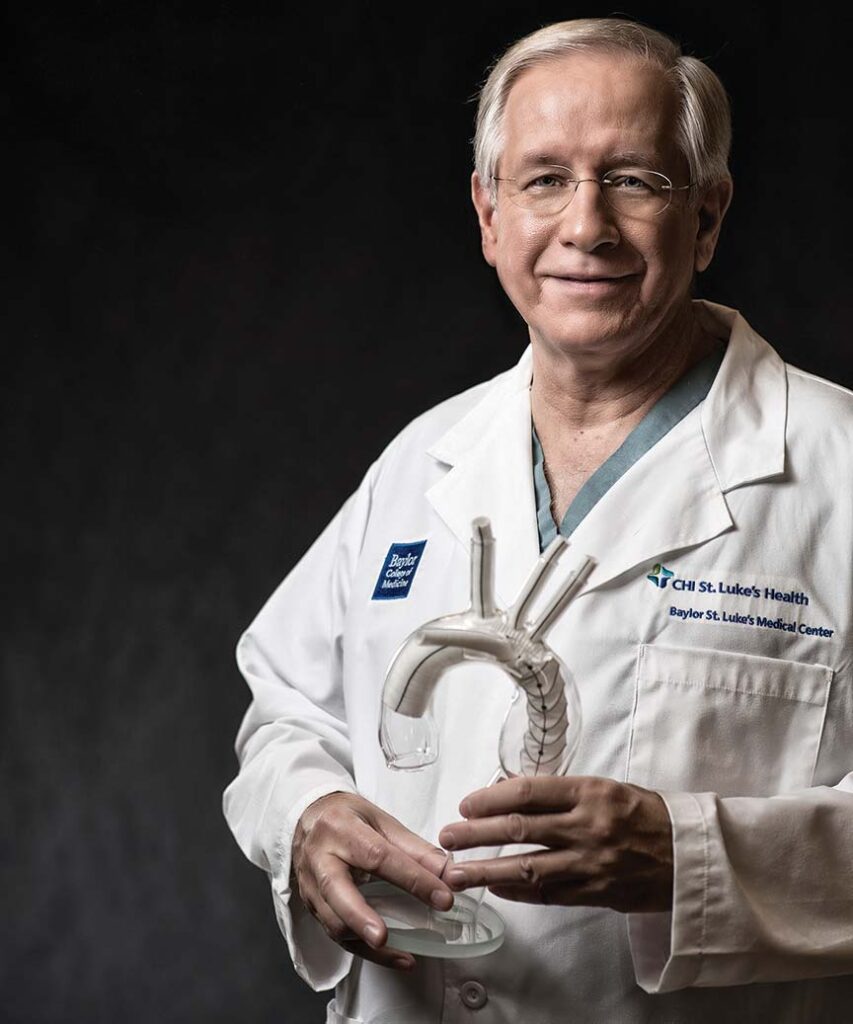
Dr. Coselli is the world’s most experienced aortic surgeon. He and his team have performed more than 10,000 repairs of the aorta and over 3,600 repairs of thoracoabdominal aortic aneurysms.
The Future of Baylor St. Luke’s
We are transitioning to the new state-of-the-science McNair Campus, one of the most innovative, unique medical communities in the world, where patients and visitors are rarely exposed to daily hospital operations to create a more comforting environment.
The hustle and bustle associated with running a medical center will be out of view and instead directed to separate sets of elevators, hallways and entrances to avoid intermingling with patients. “It really elevates the look and the feel of the campus. The result is a space that is warm and soothing yet offers access to the high-quality cutting-edge care we are known for,” said Liz Youngblood, President, Baylor St. Luke’s Medical Center.
“Patients will have convenient access to lush garden-like areas, restaurants, retail, a hotel and conference center that add to a comfortable, positive experience.”
A layered arrival garden and a series of elevated micro-gardens will enhance and vitalize the human experience, with light and views of nature acting as a backdrop for the waiting areas on each level of the building. Daylight is emphasized throughout the campus. Technology plays a key role. An innovative “Control Center” application will allow hospital patients to adjust room temperature, lighting, food orders and facilitate communication with medical staff.
“It was important to bring this technology to the bedside and fingertips of our patients so that they can control their environment while acting as a partner with us on the care we are providing,” Youngblood said.
Its visionary design ensures the highest quality care for patients while leveraging academics and research. The campus is equipped with the latest technologies from radiology, interventional radiology to nuclear medicine studies and new linear accelerators at the Dan L Duncan Comprehensive Cancer Center, which will be housed in the 12-story O’Quinn Medical Tower. The expanded cancer center will offer radiation therapy and other diagnostic and treatment services and will feature multiple specialized oncology clinics and an infusion center as well as house multiple outpatient services including radiology, endoscopy and an ambulatory surgery center. Among the new services expected to be offered at the new tower are a pain center and a women’s center for diagnostic breast imaging.
Pioneering Cardiovascular Care
Our tradition of innovative heart care dates back to 1969, with the world’s first successful human implantation of an artificial heart by renowned cardiac surgeon Denton Cooley. It is a legacy of innovation and research that we uphold to this day.
At Baylor St. Luke’s, we bring together internationally recognized research, education, and innovation from Baylor College of Medicine, the Texas Heart Institute® and other leading independent specialists to provide the latest treatments and advances in cardiology, cardiovascular surgery, minimally invasive cardiac surgery, structural heart, valve, and vascular procedures, heart transplant, arrhythmia management, stem cell, and gene therapy, and regenerative medicine. We are able to achieve more life-changing breakthroughs, discover more methods of prevention, and save more lives than ever before.
Robotic-Assisted Cardiac Surgery
Dr. Kenneth K. Liao, Chief Section of Cardiothoracic Transplantation and Mechanical Circulatory Support, Baylor St. Luke’s Medical Center, is among a handful of highly experienced robotic cardiac surgeons in the U.S. and the only cardiac surgeon in Greater Houston using the da Vinci Robotic Surgical System to treat valve and coronary disease.
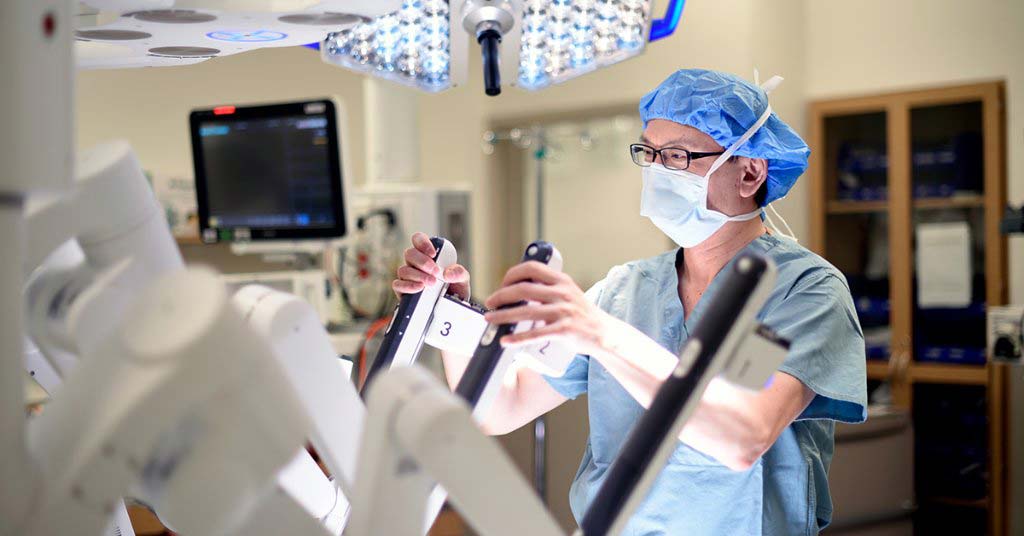
The minimally invasive, highly advanced technology uses 3D high-definition scope and robot-controlled fine instruments inside the chest to perform mitral valve repair and coronary artery bypass grafting surgery, which allows the surgeon to perform gentle and complex surgical maneuvers inside the heart. The robotic cardiac surgery program at Baylor St. Luke’s is among the top 10 programs in the U.S. and the fastest-growing program in the United States.
Leaders in AFib Care
Baylor St. Luke’s was the first in Houston to perform the convergent procedure for treating atrial fibrillation, a hybrid procedure involving a cardiac surgeon who advances an ablation cathe-ter in conjunction with a cardiac electrophysiologist who maps and completes the isolation of the pulmonary veins and posterior wall.
In a recent study, normal sinus rhythm was restored in 87% of patients, 43% were off their AFib medications three months after the procedure, and 76% were no longer having symptoms at the 6-month mark.
Cancer Care With A Personal Touch
From precision medicine to immunology to genomics, some of the most effective advances in cancer care are taking place at Baylor St. Luke’s. We remain laser-focused on the care and wellbeing of our patients. Our clinical teams and researchers come together to provide oncology care that is individually tailored to the patient, allowing us to provide leading-edge cancer treatment to patients from around the world.
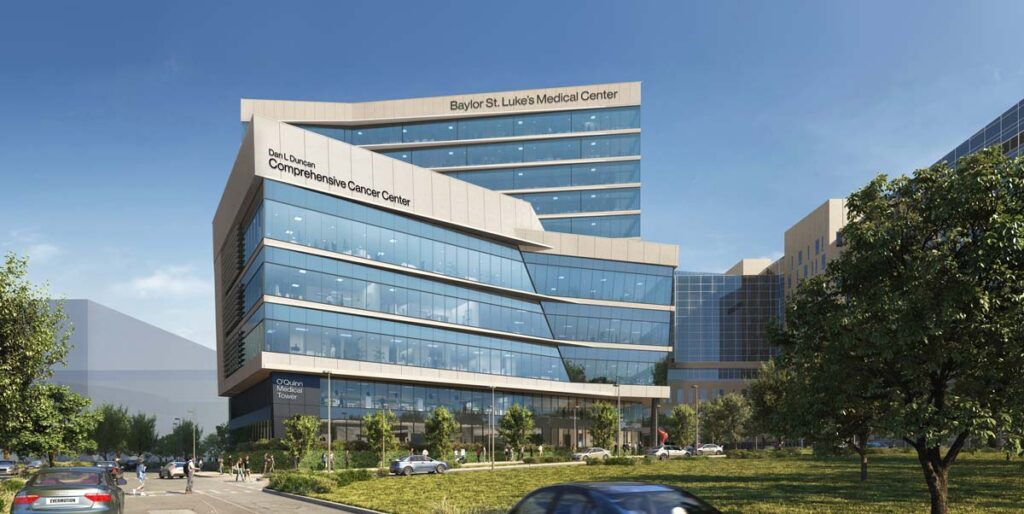
Baylor St. Luke’s is home to the Dan L Duncan Comprehensive Center. It earned the prestigious Comprehensive Cancer Center designation from the National Cancer Institute for its cutting-edge clinical research and state-of-the-art cancer therapies. “Our researchers bring innovative treatments from lab to bedside faster than ever before to help stop cancer in its tracks,” said Dr. Motthafar Rimawi, Executive Medical Director & Associate Director of Clinical Affairs of the Dan L Duncan Comprehensive Cancer Center. “It is one of the many reasons that U.S. News & World Report recently recognized Baylor St. Luke’s as one of the best hospitals in the United States for cancer care.”
Genetic Advances
Through our partnership with Baylor College of Medicine, our patients gain access to the largest clinical genetics programs in the United States. This means we have the opportunity to analyze the genetic makeup of the patient to identify the potential for cancer, take measures to prevent its onset, and develop custom treatments.
This emergent research has led to impressive clinical applications. For example, specific gene changes can be used to predict patient outcomes. This provides the oncology team with greater insight when planning the intensity of each patient’s treatment plan.
Additionally, doctors can test for gene mutations in cancer cells that can indicate efficacy of certain medications.
A Scarless Approach to Thyroid Surgery
Baylor St. Luke’s is the only center in Texas that offers the transoral endoscopic thyroidectomy vestibular approach (TOETVA) which leaves no visible scars.
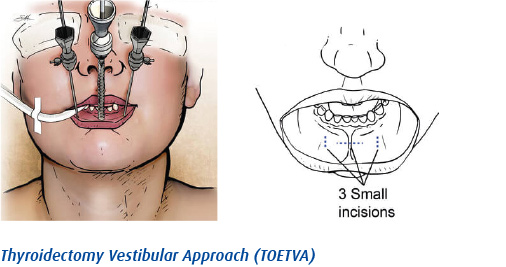
Dr. Raymon Grogan, Section Chief of Endocrine Surgery at Baylor St. Luke’s Medical Center, is one of only a few experts performing the TOETVA procedure in the United States. He was the first surgeon to perform this operation in the Midwest United States and Texas. Dr. Grogan estimates that well over 50-percent of his thyroid patients are candidates for the scarless procedure.
Precise Breast Cancer Surgery
Baylor St. Luke’s is the first hospital in the Southern U.S. to use the Sentimag Magnetic Localization System with both the Magseed technology and the newly FDA-approved Magtrace liquid tracer to locate and remove tumors in patients with invasive breast cancer.
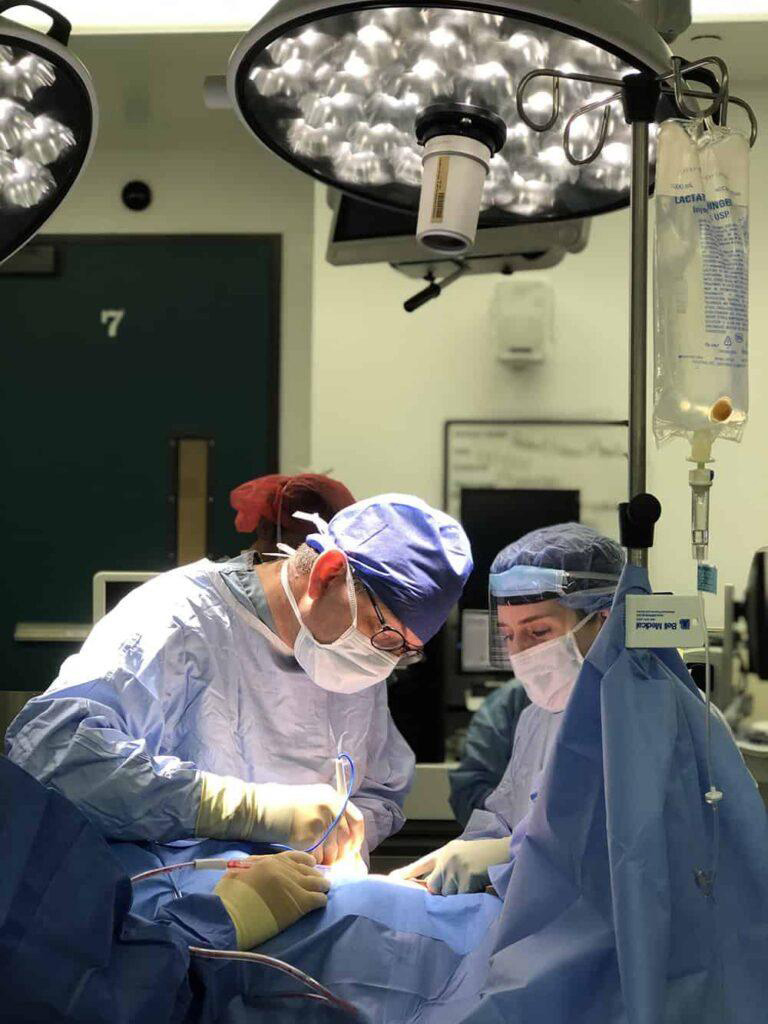
A seed is placed into the tumor and immediately evaluated during surgery by pathologists, significantly reducing the need for a second operation for re-excision. “This procedure is really transformational for the patient because it allows us to perform a finely-tuned delicate surgery rather than a big operation,” said Dr. Alastair Thompson, Chief, Section of Breast Surgery.
Genomics and Bladder Cancer Research
Baylor St. Luke’s Urologist Dr. Seth Paul Lerner, Chair of Urologic Oncology at Baylor College of Medicine, and his colleagues at Baylor College of Medicine found a connection between cancer subtype and outcomes by studying the genomic underpinnings of muscle-invasive bladder cancer. Their research found that mutation signatures, molecular subtypes, the load of new cancer-associated molecules, and known clinical and pathological factors have a clear influence on overall patient survival.
Taking these factors into account allows for more personalized and effective treatment for patients, translating into a very high survival probability, which is unprecedented in advanced bladder cancer.
Advancing the Neurosciences
As one of the leaders in stroke care in Houston and surrounding areas, Baylor St. Luke’s Medical Center leverages the most advanced innovations to improve access to the most optimal treatments for patients.
Our neurosciences team offers comprehensive care for a broad range of neurological conditions and brain disorders. We use the latest advancements in neurological medicine to treat patients effectively and with a shorter recovery time. Using breakthrough research and a collaborative approach with Baylor College of Medicine, we help patients recover lost function due to a brain tumor, stroke, or ruptured brain aneurysm. In addition to offering the latest treatment options, our neurologists and neurosurgeons continue to develop new and advanced therapies such as building a brain computer to restore vision to the blind and revolutionizing benign pituitary tumor removal.
Revolutionizing Tumor Treatment and Removal
As Chief of neuroscience service line, Baylor St. Luke’s Medical Center, Dr. Ganesh Rao, focuses on surgical management of primary and metastatic brain tumors, with a specialty in spinal column tumors. “We specialize in removing brain tumors that are difficult to access and close to areas affecting speech or motor function. We often perform these procedures while patients are awake so we can test those functions and minimize any injury to the brain while we are removing the tumor.” Dr. Rao also utilizes minimally invasive techniques such as stereotactic radiosurgery and laser interstitial thermal therapy to treat tumors that are difficult to access.
Baylor St. Luke’s pituitary center is one of the most active in the United States, with published superior surgical outcomes. We utilize a multidisciplinary approach that combines patient management protocol with a less invasive endonasal surgical technique in which surgeons enter through the nasal passage to remove the pituitary tumor. The protocol emphasizes patient education, early mobilization, and scheduled inpatient and outpatient endocrine assessments that have been shown to decrease hospital stay, complications, and readmission.
Treating Complex Spine Cases
Our specially trained team uses the latest advances to diagnose and conservatively treat spine conditions. When surgery is the best option, our surgeons use the most advanced minimally invasive techniques to alleviate and repair spine injuries and deformities.
Our team has extensive experience treating the most complex conditions, including:
- Chin-on-Chest Deformity
- Kyphotic Deformity
- Swan-Neck Deformity
- Adult Degenerative Deformity
- Unstable Fractures
- Post-Infectious Deformity of the Spine
International Services
For many decades, Baylor St. Luke’s Medical Center has been privileged to collaborate with healthcare leaders across the Middle East on patient care, training and education. Our physicians and researchers visit the Gulf region regularly to exchange knowledge and expertise and participate in medical conferences.
As part of its mission to improve healthcare worldwide, Baylor St. Luke’s and its affiliates offer customized training and education services to meet the individual needs of each organization through onsite visits, rotations and remote video conferences. In addition, Baylor St. Luke’s International team works closely with patients traveling from all over the world to make them feel at home during their stay at the hospital. We create a positive hospital experience by bridging cultural and language differences, providing personal support, and accommodating service requests. We work closely with patients and families to integrate transcultural patient care practices to provide efficient, holistic, caring, and culturally congruent care. We provide 360-degree services from prearrival scheduling to assist during their stay at our medical center, to follow up once the patient returns home.
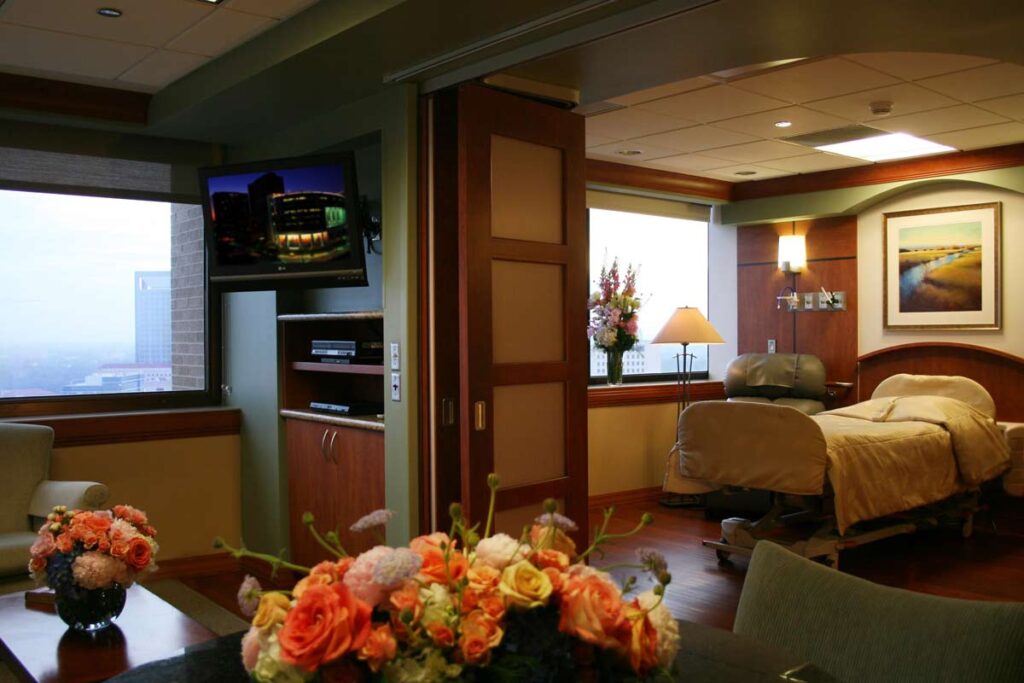
https://about.stlukeshealth.org/bslmcinternational














